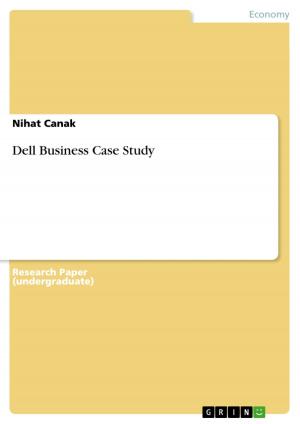| Author: | Elisabeth Luger | ISBN: | 9783638195386 |
| Publisher: | GRIN Publishing | Publication: | June 10, 2003 |
| Imprint: | GRIN Publishing | Language: | English |
| Author: | Elisabeth Luger |
| ISBN: | 9783638195386 |
| Publisher: | GRIN Publishing |
| Publication: | June 10, 2003 |
| Imprint: | GRIN Publishing |
| Language: | English |
Seminar paper from the year 2003 in the subject Business economics - General, grade: B/C, University of Linz (technical language), course: Business English2, 5 entries in the bibliography, language: English, abstract: While discovering that Siemens Austria is going to be too big as we could present it in one hour we took a only one of the most successful parts of Siemens which is called Siemens Dematic. Our company presentation is based on this particular part of the company - the logistics division of Siemens AG Austria. Followed by some history and general information we want to focus on our three special topics Human Recourse Management, Outside Influences on Siemens and Cross Cultural Management. For the critical revue we chose the Annual Report and some articles in Austrian Newspapers, which you can find in the Appendix to our paper. Werner von Siemens, the founder, was born on the 13.th of December near Hanover. His numerous innovative ideas, for example in the field of telegraphy made him to the visionary in engineering history. To built his first telegraph he used just a piece of wire, one cigarette packet, and as mall piece of iron.1 Due to collaborations with other nations in order to find innovative solutions, Werner von Siemens built up a global network and consequently the today's working multinational.2 He started the expansion to England and Russia, later Asia and America.3 Today Siemens is to be found in more than 190 countries.4Siemens AG Austria is the most successful of all Siemens national companies around the world. As part of the 'Global Network of Innovation' Siemens Austria sees itself as an Austrian company with European and international ties and orientation in a way as a 'Regional Network of Innovation'. Therefore Siemens AG Austria represents a special significance for the domestic economy and value added.5 The annual report talks about a ' Corporate Citizenship' and refers to contributions to art and culture as well as social matters. 6 [...] 1 Siemens, Werner von, Lebenserinnerungen, Prestel-Verlag München 1966 2 Siemens, Werner von, Lebenserinnerungen, Prestel-Verlag München 1966 3 Siemens, Werner von, Lebenserinnerungen, Prestel-Verlag München 1966 4 http://w4.siemens.de/annualreport_2002/overview.shtml 5 http://www/bereiche/cc/cchome/index.htm 6 http://www/bereiche/cc/cchome/index.htm
Seminar paper from the year 2003 in the subject Business economics - General, grade: B/C, University of Linz (technical language), course: Business English2, 5 entries in the bibliography, language: English, abstract: While discovering that Siemens Austria is going to be too big as we could present it in one hour we took a only one of the most successful parts of Siemens which is called Siemens Dematic. Our company presentation is based on this particular part of the company - the logistics division of Siemens AG Austria. Followed by some history and general information we want to focus on our three special topics Human Recourse Management, Outside Influences on Siemens and Cross Cultural Management. For the critical revue we chose the Annual Report and some articles in Austrian Newspapers, which you can find in the Appendix to our paper. Werner von Siemens, the founder, was born on the 13.th of December near Hanover. His numerous innovative ideas, for example in the field of telegraphy made him to the visionary in engineering history. To built his first telegraph he used just a piece of wire, one cigarette packet, and as mall piece of iron.1 Due to collaborations with other nations in order to find innovative solutions, Werner von Siemens built up a global network and consequently the today's working multinational.2 He started the expansion to England and Russia, later Asia and America.3 Today Siemens is to be found in more than 190 countries.4Siemens AG Austria is the most successful of all Siemens national companies around the world. As part of the 'Global Network of Innovation' Siemens Austria sees itself as an Austrian company with European and international ties and orientation in a way as a 'Regional Network of Innovation'. Therefore Siemens AG Austria represents a special significance for the domestic economy and value added.5 The annual report talks about a ' Corporate Citizenship' and refers to contributions to art and culture as well as social matters. 6 [...] 1 Siemens, Werner von, Lebenserinnerungen, Prestel-Verlag München 1966 2 Siemens, Werner von, Lebenserinnerungen, Prestel-Verlag München 1966 3 Siemens, Werner von, Lebenserinnerungen, Prestel-Verlag München 1966 4 http://w4.siemens.de/annualreport_2002/overview.shtml 5 http://www/bereiche/cc/cchome/index.htm 6 http://www/bereiche/cc/cchome/index.htm















